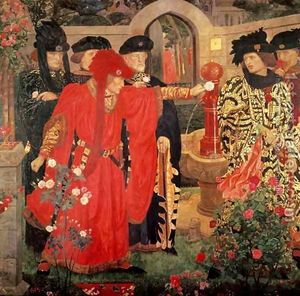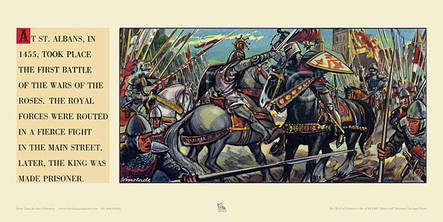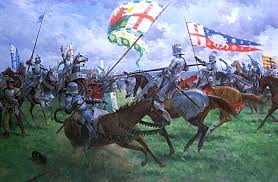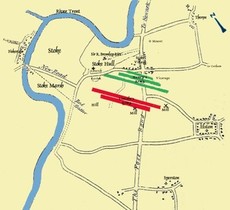At some point Richard III may have considered Edward Plantagenet his heir and had him placed at Sheriff Hutton in North Yorkshire for his own protection, but it may be that he considered him a threat to his throne, but on Richards death in 1485 the new Lancastrian regime quickly had him removed and placed under heavy guard at the Tower of London. Despite being ten years old, Henry also considered him a threat and needed him watched to prevent Yorkists organising his escape and using him as a reason to rebel. Henry used Edward two years later when he paraded him in London after Lambert Simnel's challenge to his throne. In 1499 Warbeck entered the scene and it was he whose actions were the beginning of the end for Edward. It was alleged that Edward had plotted with and was involved in Warbeck's attempt to overthrow the king. Warbeck confessed to the plot, under torture, but I cannot say if Edward did. Either way, Edward went to his death Tower Hill a week after Warbeck execution.
|
November 1499, saw the death of the grandson of the Richard, Duke of York and Cecily Neville. Edward Plantagenet, was the son of George, Duke of Clarence, brother to Edward IV and Richard III who death is recorded as the 28th of this month. Edwards life was abysmal, his mother died when he was just a year old and he was only three when his father was executed, his wardship was granted in 1480 to Thomas Grey, the son of Elizabeth Woodville by her first husband. It has been said that Edward suffered from some sort of mental illness, but I imagine it was more to do with anxiety and lack of care and/or the fact that he received little or no education. By the time he was twenty-four he had spent sixteen years in confinement, away from court, away from influences and activities of Yorkist sympathisers and he would have known little of what was going on in Henry's new kingdom. Bearing this in mind and the fact that he was heavily guarded it is hard to believe that he was in cahoots with Perkin Warbeck and knew of the plans to overthrow Henry VII, it is more than likely that Henry VII used this opportunity to rid himself of a man with better claim to the throne than his.
At some point Richard III may have considered Edward Plantagenet his heir and had him placed at Sheriff Hutton in North Yorkshire for his own protection, but it may be that he considered him a threat to his throne, but on Richards death in 1485 the new Lancastrian regime quickly had him removed and placed under heavy guard at the Tower of London. Despite being ten years old, Henry also considered him a threat and needed him watched to prevent Yorkists organising his escape and using him as a reason to rebel. Henry used Edward two years later when he paraded him in London after Lambert Simnel's challenge to his throne. In 1499 Warbeck entered the scene and it was he whose actions were the beginning of the end for Edward. It was alleged that Edward had plotted with and was involved in Warbeck's attempt to overthrow the king. Warbeck confessed to the plot, under torture, but I cannot say if Edward did. Either way, Edward went to his death Tower Hill a week after Warbeck execution.
0 Comments
This is a question with no easy answer, but it can be looked at in a number of ways. If we consider the Wars of the Roses began in 1455 with the first battle of St Albans we should look at the Battle of Tewkesbury as the final battle in these wars. The origins of these battles had their roots in the rivalry between the Duke of Somerset and the Duke of York. Following King Henry VI 'regaining his senses' Edmund Beaufort was given back his former post. To make matters worse, Beaufort was also given the captaincy of Calais which really rubbed York up the wrong way, eventually, it came to blows at St Albans. You could say that the following fifteen battles, not including Bosworth and Stoke, were just a continuation of this, although there was far more to it than that. The beginning of the end was the death of Henry VI's son Edward at Tewkesbury, followed seventeen days later by Henry himself. You could that say the Wars of the Roses did indeed end at Tewkesbury. On the other hand, if you consider, like I do, the Wars of the Roses began or at least the seeds were set on the 8th June 1376 with the death of Edward III's heir Edward the Black Prince. The fallout from the Black Prince's death cannot be underestimated. A boy king, an influential and 'lustful' uncle, an illegitimate brood and a usurper, lead you to follow two lines. Firstly that of the usurper, where you end up at Henry VI and Margaret Beaufort/Henry Tudor and secondly, if you follow the line of John Beaufort, Gaunt's illegitimate son, you get Margaret Beaufort and Henry Tudor. Which line you follow makes no difference you will end up with events of 1483 to 1485. With all that in mind, you will have to say that the Wars of the Roses ended at Bosworth. Two years after Bosworth the armies of York and Lancaster met again at Stoke Field in Nottinghamshire. Henry VII found himself in the same position as that of Richard III defending his crown and facing a rebel army who were intent on placing a Plantagenet on the throne, albeit an impostor. Lambert Simnel, a claimant to England's throne posing as Edward, Earl of Warwick, was crowned in Dublin by John de la Pole and Francis Lovell. With a Plantagenet claimant as their figurehead, only Henry VII stood in their way. John de la Pole died on the battlefield, Lovell's body was not among the dead, but his days were numbered. This battle effectively wiped out the last of the Yorkist rebels, enabling Henry VII to establish the Tudor dynasty virtually unchallenged, on the battlefield at least. Did the Wars of the Roses end with the Lancastrian victory at Stoke Field? What is the answer then Tewkesbury, Bosworth or Stoke? |
Categories
All
Archives
May 2024
|





 RSS Feed
RSS Feed
